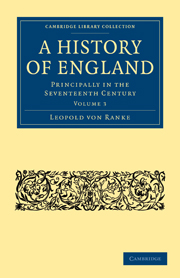Book contents
- Frontmatter
- Contents
- BOOK XI THE COMMONWEALTH IN ENGLAND, 1649—1653
- BOOK XII THE PROTECTORATE OF OLIVER CROMWELL, 1653–1658
- CHAP. I Oliver Cromwell and his elevation to the Protectorate
- CHAP. II Embassy to Sweden. Peace with Holland
- CHAP. III The Parliament of 1654
- CHAP. IV Military government. Religious tolerance
- CHAP. V Rupture with Spain
- CHAP. VI The Parliament of 1656, 1657. Idea of a Cromwellian Monarchy
- CHAP. VII The general position of the Protectorate at home and abroad in 1657 and 1658
- CHAP. VIII Death of Oliver Cromwell
- BOOK XIII FALL OF THE PROTECTORATE AND THE COMMONWEALTH. RESTORATION OF THE MONARCHY, 1658—1660
- BOOK XIV THE FIRST FIVE YEARS UNDER CHARLES II. THE RESTORATION OF THE ANGLICAN CHURCH
- BOOK XV THE DUTCH WARS OF CHARLES II. ESTABLISHMENT OF THE PROTESTANT AND PARLIAMENTARY CHARACTER OF THE CONSTITUTION 1664—1674
CHAP. IV - Military government. Religious tolerance
Published online by Cambridge University Press: 07 June 2011
- Frontmatter
- Contents
- BOOK XI THE COMMONWEALTH IN ENGLAND, 1649—1653
- BOOK XII THE PROTECTORATE OF OLIVER CROMWELL, 1653–1658
- CHAP. I Oliver Cromwell and his elevation to the Protectorate
- CHAP. II Embassy to Sweden. Peace with Holland
- CHAP. III The Parliament of 1654
- CHAP. IV Military government. Religious tolerance
- CHAP. V Rupture with Spain
- CHAP. VI The Parliament of 1656, 1657. Idea of a Cromwellian Monarchy
- CHAP. VII The general position of the Protectorate at home and abroad in 1657 and 1658
- CHAP. VIII Death of Oliver Cromwell
- BOOK XIII FALL OF THE PROTECTORATE AND THE COMMONWEALTH. RESTORATION OF THE MONARCHY, 1658—1660
- BOOK XIV THE FIRST FIVE YEARS UNDER CHARLES II. THE RESTORATION OF THE ANGLICAN CHURCH
- BOOK XV THE DUTCH WARS OF CHARLES II. ESTABLISHMENT OF THE PROTESTANT AND PARLIAMENTARY CHARACTER OF THE CONSTITUTION 1664—1674
Summary
The course which events had taken, the complete collapse of a scheme which depended on the co-operation of Parliament, and the continued rule of a power unrecognised by law, afforded in itself a fresh stimulus to all party-efforts.
The Republicans found it intolerable that after twelve years of struggle in behalf of justice and liberty, which had deluged the country with blood, these liberties should lie at the mercy of a usurper. If it were true, as he asserted, that he held by divine right a power the limits of which he alone might fix, then was England but a pensioner on his bounty: it was the duty of every true Englishman to take care that matters should never go so far as to allow any single man to make himself master of the Parliament, and to secure their ancient liberty.
And in a similar way the party of the so-called saints and elect of God complained of the light esteem in which the fruit of their prayers was held, the marvellous works that God had manifested; the country was still to be loaded with the fetters of the Norman law. They denounced Cromwell as the man of sin, who set himself up as the temple of God, even as God himself.
- Type
- Chapter
- Information
- A History of EnglandPrincipally in the Seventeenth Century, pp. 140 - 153Publisher: Cambridge University PressPrint publication year: 2010First published in: 1875

